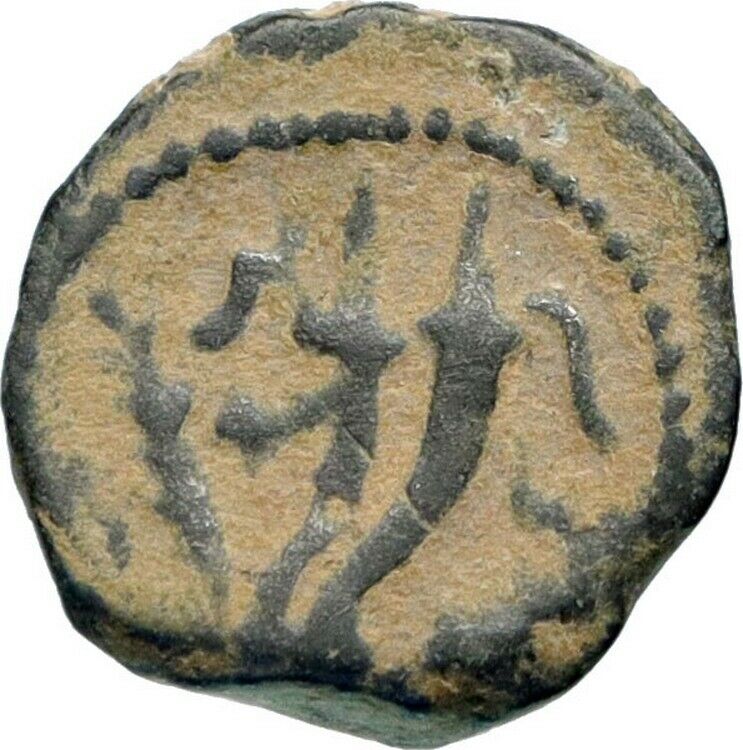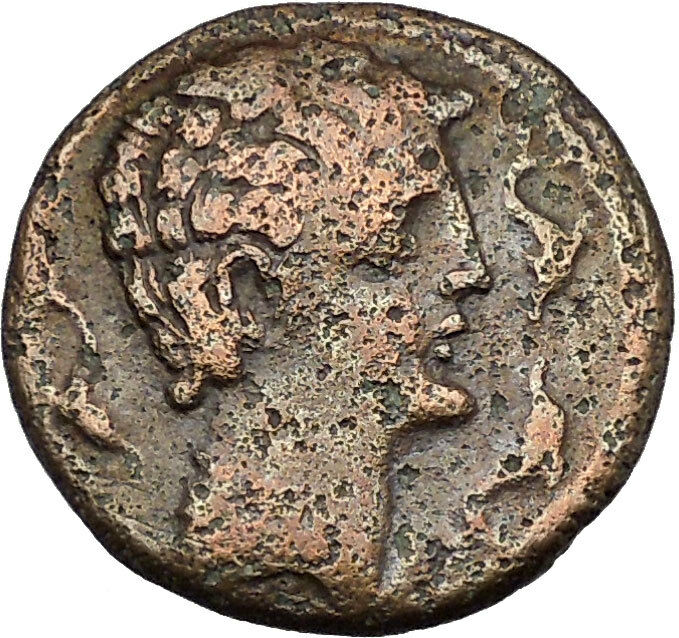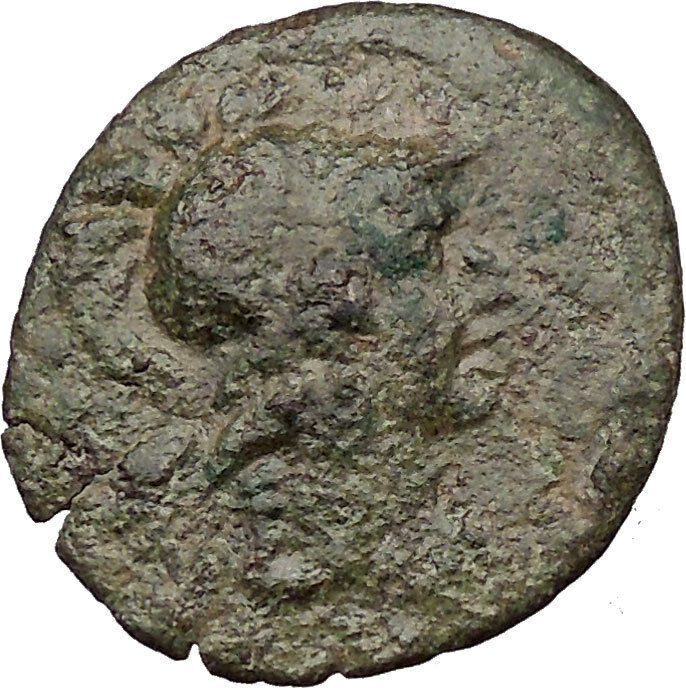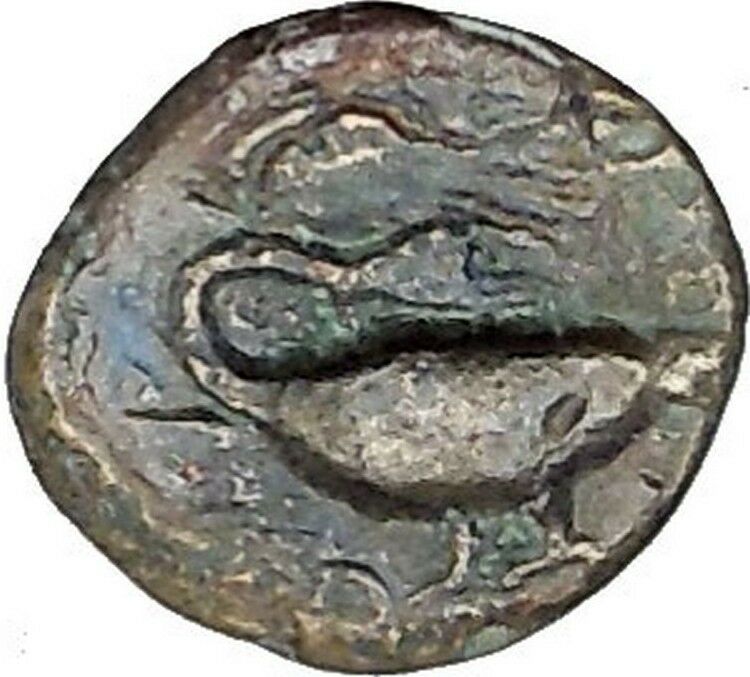|
Greek city of Massalia in Gaul
Silver Obol 9mm (0.40 grams) Struck 400-375 B.C.
Reference: Sear 72; Forrer 156; De la Tour 580 Tour 580
Youthful male head of Apollo left.
Wheel with four spokes, M – A in two of the quarters.
Greek contact with Gaul dated from circa 600 B.C. when the Phokaians founded the city of Massalia (Marseilles)on the Mediterranean coast. Two hundred years alter the Massilots formed an alliance with the ROman Republic, an arrangement which was destined to be of inestimable value to the Romans as it protected the vital communications with Spain. In the latter part of the Second Century B.C. Massalia found itself seriously threatened by the Celtic tribes. The Romans utilized this situation to intervene in the affairs of southern Gaul, and the Ligurain tribes were conquered by 123 B.C., the Allobroges and the Arverni two years alter. These successes led to the formation of the Roman province of Gallia. Transalpina – the provincia whose memory is perpetuated by present-day Provence. In 118 B.C. Narbo Martius (Narbonne) was founded as a Roman colony and trade witht he interior of the country rapidly began to flourish as Roman businessmen established themselves in the provincia. The final conquest of the whole of Gaul was carried out by Julius Caesar between 58 and 50 B.C. These remarkable campaigns are immortalized in Caesar’s famous “Commentaries.”
You are bidding on the exact item pictured, provided with a Certificate of Authenticity and Lifetime Guarantee of Authenticity.
 In Greek and Roman mythology, Apollo, is one of the most important and diverse of the Olympian deities. The ideal of the kouros (a beardless youth), Apollo has been variously recognized as a god of light and the sun; truth and prophecy; archery; medicine and healing; music, poetry, and the arts; and more. Apollo is the son of Zeus and Leto, and has a twin sister, the chaste huntress Artemis. Apollo is known in Greek-influenced Etruscan mythology as Apulu. Apollo was worshiped in both ancient Greek and Roman religion, as well as in the modern Greco-Roman Neopaganism. In Greek and Roman mythology, Apollo, is one of the most important and diverse of the Olympian deities. The ideal of the kouros (a beardless youth), Apollo has been variously recognized as a god of light and the sun; truth and prophecy; archery; medicine and healing; music, poetry, and the arts; and more. Apollo is the son of Zeus and Leto, and has a twin sister, the chaste huntress Artemis. Apollo is known in Greek-influenced Etruscan mythology as Apulu. Apollo was worshiped in both ancient Greek and Roman religion, as well as in the modern Greco-Roman Neopaganism.
As the patron of Delphi (Pythian Apollo), Apollo was an oracular god – the prophetic deity of the Delphic Oracle. Medicine and healing were associated with Apollo, whether through the god himself or mediated through his son Asclepius, yet Apollo was also seen as a god who could bring ill-health and deadly plague as well as one who had the ability to cure. Amongst the god’s custodial charges, Apollo became associated with dominion over colonists, and as the patron defender of herds and flocks. As the leader of the Muses (Apollon Musagetes) and director of their choir, Apollo functioned as the patron god of music and poetry. Hermes created the lyre for him, and the instrument became a common attribute of Apollo. Hymns sung to Apollo were called paeans.
In Hellenistic times, especially during the third century BCE, as Apollo Helios he became identified among Greeks with Helios, god of the sun, and his sister Artemis similarly equated with Selene, goddess of the moon. In Latin texts, on the other hand, Joseph Fontenrose declared himself unable to find any conflation of Apollo with Sol among the Augustan poets of the first century, not even in the conjurations of Aeneas and Latinus in Aeneid XII (161-215). Apollo and Helios/Sol remained separate beings in literary and mythological texts until the third century CE.
Humans have inhabited Marseille and its environs for almost 30,000 years: palaeolithic cave paintings in the underwater Cosquer cave near the calanque of Morgiou date back to between 27,000 and 19,000 BC; and very recent excavations near the railway station have unearthed neolithic brick habitations from around 6,000 BC.
Marseille, the oldest city in France, was founded in 600 BC by Greeks from Phocaea (as mentioned by Thucydides Bk1,13) as a trading port under the name Μασσαλία (Massalia; see also List of traditional Greek place names). The precise circumstances and date of founding remain obscure, but nevertheless a legend survives. Protis, while exploring for a new trading outpost or emporion for Phocaea, discovered the Mediterranean cove of the Lacydon, fed by a freshwater stream and protected by two rocky promontories. Protis was invited inland to a banquet held by the chief of the local Ligurian tribe for suitors seeking the hand of his daughter Gyptis in marriage. At the end of the banquet, Gyptis presented the ceremonial cup of wine to Protis, indicating her unequivocal choice. Following their marriage, they moved to the hill just to the north of the Lacydon; and from this settlement grew Massalia.[10]
Massalia was one of the first Greek ports in Western Europe, growing to a population of over 1000. It was the first settlement given city status in France. Facing an opposing alliance of the Etruscans, Carthage and the Celts, the Greek colony allied itself with the expanding Roman Republic for protection. This protectionist association brought aid in the event of future attacks, and perhaps equally important, it also brought the people of Massalia into the complex Roman market. The city thrived by acting as a link between inland Gaul, hungry for Roman goods and wine (which Massalia was steadily exporting by 500 BC), and Rome’s insatiable need for new products and slaves. Under this arrangement the city maintained its independence until the rise of Julius Caesar, when it joined the losing side (Pompey and the optimates) in civil war, and lost its independence in 49 BC.
It was the site of a siege and naval battle, after which the fleet was confiscated by the Roman authorities. During Roman times the city was called Massilia. It was the home port of Pytheas. Most of the archaeological remnants of the original Greek settlement were replaced by later Roman additions.
Marseille adapted well to its new status under Rome. During the Roman era, the city was controlled by a directory of 15 selected “first” among 600 senators. Three of them had the preeminence and the essence of the executive power. The city’s laws amongst other things forbade the drinking of wine by women and allowed, by a vote of the senators, assistance to allow a person to commit suicide.
It was during this time that Christianity first appeared in Marseille, as evidenced by catacombs above the harbour and records of Roman martyrs. According to provencal tradition, Mary Magdalen evangelised Marseille with her brother Lazarus. The diocese of Marseille was set up in the first century AD (it became the Archdiocese of Marseille in 1948).
|





 In Greek and Roman mythology, Apollo, is one of the most important and diverse of the Olympian deities. The ideal of the kouros (a beardless youth), Apollo has been variously recognized as a god of light and the sun; truth and prophecy; archery; medicine and healing; music, poetry, and the arts; and more. Apollo is the son of Zeus and Leto, and has a twin sister, the chaste huntress Artemis. Apollo is known in Greek-influenced Etruscan mythology as Apulu. Apollo was worshiped in both ancient Greek and Roman religion, as well as in the modern Greco-Roman Neopaganism.
In Greek and Roman mythology, Apollo, is one of the most important and diverse of the Olympian deities. The ideal of the kouros (a beardless youth), Apollo has been variously recognized as a god of light and the sun; truth and prophecy; archery; medicine and healing; music, poetry, and the arts; and more. Apollo is the son of Zeus and Leto, and has a twin sister, the chaste huntress Artemis. Apollo is known in Greek-influenced Etruscan mythology as Apulu. Apollo was worshiped in both ancient Greek and Roman religion, as well as in the modern Greco-Roman Neopaganism.




